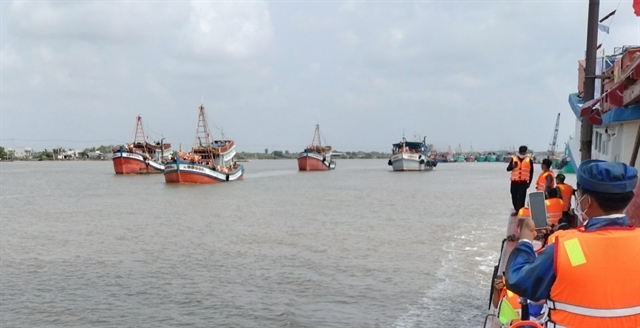 Society
Society

 |
| Fishing fleet in the southern province of Bạc Liêu. — VNA/VNS Photo |
HÀ NỘI — Vietnamese fishing vessels’ infringements of foreign waters have gradually decreased over the past years, which is the clearest demonstration of the border guard and other forces’ moves to fight illegal, unreported, and unregulated (IUU) fishing, an official has said.
Notably, violations of the waters of Pacific Islands nations such as Australia, Palau, New Caledonia, and Papua New Guinea have been eradicated since 2018, noted Col. Vũ Văn Hưng, Deputy Chief of the Staff of the Border Guard High Command, in a recent interview granted to the Vietnam News Agency.
He said that placing importance on the IUU fishing combat, the High Command had seriously followed the directions given by the Party Central Committee, the Government, and the Ministry of National Defence while issuing a number of documents on concerted measures against IUU fishing. In particular, it launched a peak crackdown on IUU fishing through this April before the European Commission (EC) comes to Việt Nam for the fifth inspection over the issue.
During the campaign, it has been coordinating with the Party committees of coastal localities to enhance the leadership and directions over the work, increase personnel and vehicles for key border guard posts, and set up teams for patrolling islands, river mouths, estuaries where many unregistered and unlicensed fishing vessels or those without vessel monitoring systems (VMS) are often concentrated in to ensure all vessels operating at sea are eligible.
Another focal task the High Command has been performing is to work with local forces and administrations to boost communications and law dissemination to raise fishermen’s awareness, classify and make dossiers for strictly managing violating vessels and high-risk ones, and early detecting IUU practices to take timely counter-measures, according to Hưng. The aim is to reduce the ‘makeshift’ nature of current fishing practices among Vietnamese fishermen, and move towards sustainable, controlled, responsible aquatic exploitation.
Besides, it has maintained communication channels with other forces and localities in the IUU fishing combat.
Through propaganda and mobilisation efforts, practical and effective models have been established, with some prominent ones being "Safe Boat Team", "Patrol Team for Ensuring Security and Order in Coastal Border Areas", "Education Team for Coastal Border Areas"; "Safe Production Team at Sea"; "Women's Club for Development and Peace at Sea", "Progressive, Secure Residential Area in Security and Order"; "Breakfast with Fishermen", "Border Guard Loudspeaker".
To prevent and put an end to vessels' infringement of foreign waters, the High Command will maintain close coordination with relevant forces and local authorities to strongly implement the Prime Minister and the Defence Ministry’s directions on urgent solutions to fight IUU fishing and lift the EC’s “yellow card” warning.
It will effectively use the VMS system to monitor all fishing vessels at sea, detect any case of VMS connection rule violations, and demand the vessels going beyond the maritime boundary return to the Vietnamese waters in a timely manner.
Another important task is to order border guard units coordinate with local agriculture and fisheries authorities to make proper preparations for working sessions with the EC delegation, according to the official.
Việt Nam has been working hard to carry out the EC’s recommendations about IUU fishing prevention and control, towards the goal of having the EC's yellow card lifted.
The EC issued a “yellow card” warning for Việt Nam in this regard in 2017. The "yellow card" is followed by a "green card" if the problem is resolved or a "red card" if it is not. A “red card” may lead to a ban on aquatic exports to the EU.
Hưng said fishermen venturing out to sea was not just for extracting marine resources but they also were actively contributing to the protection of the sovereignty of the sea and homeland islands.
“Therefore, our Party and Government are deeply concerned about the lives of fishermen and create the most favourable conditions for them, especially the Prime Minister’s Decision 48/2010/QĐ-TTg on a number of policies to encourage and support the exploitation and cultivation of aquaculture, and seafood exploitation services in distant sea areas. This contributes to ensuring security, national defence, protecting the sovereignty of sea and islands, enhancing the presence of fishing vessels and fishermen in offshore areas, Hoàng Sa (Paracel) and Trường Sa (Spratly) Islands, and DK1 rigs of Việt Nam to assert Việt Nam’s sovereignty over the sea."
The Border Guard forces had coordinated and effectively utilised its own communication system and related forces’, timely disseminating, instructing, and assisting fishermen when fishing in offshore areas to know how to respond to natural disasters and protect themselves before assistance from functional forces arrives.
The Border Guard forces coordinated with the Coast Guard and the Navy to support and protect fishermen when they are apprehended by foreign authorities in waters under Việt Nam’s sovereignty and overlapping areas yet to be defined between Việt Nam and neighbouring countries, the border guard official confirmed. — VNS




